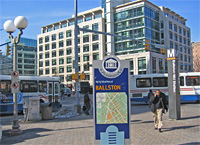Metropolitan Washington Council of Governments Identified Smart Growth Strategies for More Resilient Communities

The Metropolitan Washington Council of Governments (MWCOG) worked with EPA through a technical assistance project to help develop climate adaptation policy options for the consideration of its local jurisdictions. The project sought to help local communities prepare for climate change impacts while bringing other environmental, economic, and social benefits. To determine regional vulnerabilities, MWCOG used regional climate change projections from the 2009 National Climate Assessment combined with findings from the Maryland and Virginia state climate commissions, university studies, regional planning group assessments, and input from local government staff. MWCOG relied on its standing committees (made up of representatives from its member jurisdictions) related to buildings, land use, transportation, and water sectors for input on the project and to keep its members engaged throughout the process. This regional effort provided localities with information, such as an analysis of projected climate impacts and how they would affect different sectors, that would have been difficult to develop and duplicative if conducted separately. The effort also raised awareness of climate adaptation in the region and encouraged local governments to explore multi-benefit strategies while anticipating, planning, and preparing for climate change. This effort also resulted in EPA developing the report: "Using Smart Growth Strategies to Create More Resilient Communities in the Washington, D.C., Region (2013)".
| How Did They Do It? | Applicable EPA Tools |
|---|---|
MWCOG reviewed climate vulnerabilities and identified potential adaptation strategies
|
EPA’s Local Government Climate Adaptation Training provides a better understanding of how climate change can impact municipal services. |
| Under the technical assistance program, and with input from MWCOG's stakeholders, EPA developed Using Smart Growth Strategies to Create More Resilient Communities in the Washington, D.C., Region, to give local governments policy options to consider when preparing for future climate risks. |
Using Smart Growth Strategies to Create More Resilient Communities in the Washington, D.C., Region guidebook helps identify policy options for your community to consider when preparing for future climate risks. |
MWCOG engaged member jurisdictions to spread awareness of potential adaptation strategies
|
Visit the Climate Resilience Toolkit to find more federal trainings and resources that can help communities spread awareness of potential adaptation strategies. |
Similar Cases and More Information
To find out more about the region’s activities on climate adaptation, visit the MWCOG’s Climate Change Impacts and Adaptation web page. Many other communities have collaborated with neighboring municipalities, regional entities or with non-profits to support adaptation planning efforts. To view another case where multiple government jurisdictions collaborated to perform a regional projection for sea level rise and identify adaptation options, view the Southeast Florida regional Climate Compact. Finally, view the Anacortes Water Utility to see how another community used a regional climate assessment, conducted by a neighboring municipality, to rebuild their water treatment plant and account for future climate risk.
- Climate Change Impacts and Adaptation web page
- Southeast Florida regional Climate Compact
- Anacortes Water Utility
